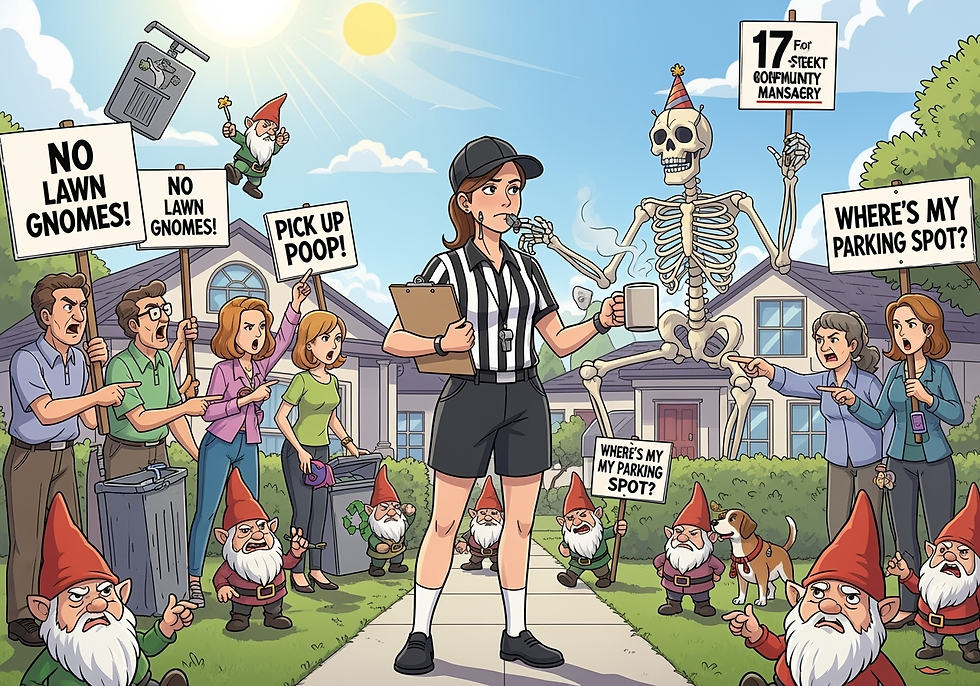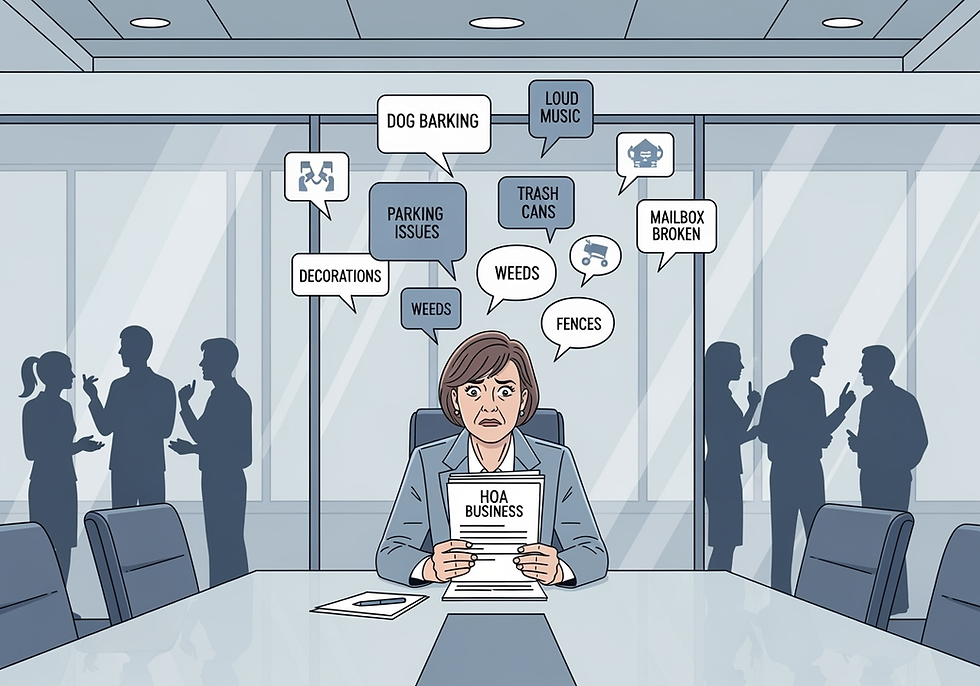5 Signs Your HOA Needs Professional Management (And What to Do About It)
- Katie Harevich
- Jun 8
- 3 min read
Is your HOA board drowning in responsibilities? Here's how to tell when it's time to call in the pros.
Running a homeowners association can feel like juggling flaming torches while riding a unicycle. If you're a board member reading this at 11 PM (again) trying to sort through vendor quotes, you're not alone. Many HOA boards start with the best intentions but quickly discover that effective community management requires more time, expertise, and energy than volunteers can sustainably provide.
🚨 Sign #1: Board Meetings Have Become Crisis Management Sessions
What it looks like: Every meeting feels like putting out fires instead of planning for the future. You're constantly dealing with emergency repairs, upset residents, and last-minute decisions.
Why it happens: Without proper systems and preventive planning, small issues snowball into major problems that demand immediate attention.
The real cost: Reactive management is always more expensive than proactive planning. That "quick fix" often becomes a costly emergency repair.
📊 Sign #2: Financial Records Are a Mystery (Even to You)
What it looks like:
Reserve fund balances that nobody can explain
Inconsistent financial reporting
Board members asking "Where did that money go?"
Difficulty preparing annual budgets
Why it's dangerous: Poor financial oversight can lead to special assessments, legal issues, and loss of homeowner confidence. In Massachusetts, HOAs have specific fiduciary responsibilities that can't be ignored.
The wake-up call: If your treasurer is spending more time trying to understand the books than planning for the future, it's time for professional help.
🔧 Sign #3: Maintenance Issues Keep Multiplying
What it looks like:
The same problems keep recurring
Vendor management feels like herding cats
Emergency repairs that could have been prevented
Residents complaining about response times
The hidden problem: Without established vendor relationships and maintenance schedules, you're always starting from scratch. Professional property managers have vetted contractor networks and preventive maintenance programs that save money long-term.
😤 Sign #4: Board Burnout Is Real (And Visible)
What it looks like:
Difficulty finding volunteers for board positions
Current board members talking about quitting
Meetings that feel more like therapy sessions
Personal conflicts affecting community decisions
The truth: Volunteer board members have their own lives, careers, and families. When HOA management becomes a second job, something has to give – and it's usually the community that suffers.
📞 Sign #5: Communication Has Broken Down
What it looks like:
Residents finding out about important decisions after the fact
Multiple board members giving different answers to the same question
Social media complaints about lack of transparency
Difficulty reaching board members for urgent issues
Why it matters: Poor communication destroys community trust and can lead to legal challenges. Professional management companies have established communication protocols and 24/7 response systems.

What to Do About It: Your Action Plan
Step 1: Acknowledge the Problem
The first step is admitting that volunteer management isn't working. This isn't a failure – it's recognizing that your community deserves professional-level service.
Step 2: Evaluate Your Options
Not all property management companies are created equal. Look for:
Local expertise in New England HOA regulations
Transparent pricing with no hidden fees
Established emergency response protocols
Proven financial management systems
Limited client portfolios that ensure personalized attention
Step 3: Calculate the Real Cost
Compare the hidden costs of volunteer management:
Emergency repairs that could have been prevented
Legal issues from compliance mistakes
Lost property values from poor maintenance
Board member time (what's your time worth per hour?)
Step 4: Make the Transition
Professional management companies should handle the entire transition process, including:
Financial record review and organization
Vendor relationship establishment
Communication system setup
Emergency protocol implementation
The Bottom Line
Your HOA board volunteered to serve the community, not to become unpaid property management professionals. When the signs point to needing help, the question isn't whether you can afford professional management – it's whether you can afford not to have it.
Ready to explore your options? Professional HOA management doesn't have to mean losing control of your community. The right management company becomes your partner, handling the day-to-day operations while keeping your board informed and involved in major decisions.
At Dahlia Property Solutions, we specialize in boutique HOA management for New England communities. Our 1:5 property manager-to-client ratio ensures your association gets the personalized attention it deserves.
Ready to learn more? Contact us for a no-obligation consultation.
Contact Information: 📞 774-571-9871



Comments